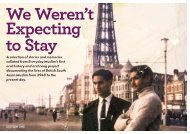Race, Faith and Community in Contemporary Britain Essays on Black, African, and African Caribbean Muslims in the UK PROUDLY MUSLIM & BLACK REPORT 2022
Black British Muslims play an important role in British society but are poorly represented in public discourse, policy, and indeed across a range of sectors. To overcome structural disadvantages and racism in society and in Muslim communities, we aim to create a platform for interventions in discourse and representation as well as in power relations. Our effort is collaborative and aimed at exploring the diversity, contributions, heritage, as well as the history of Black British Muslims. Our objective in this report is to create a platform to review and consider the current state of race and power relations, while creating networks and partnerships. In short, bringing Black British Muslim voices to the forefront is to work towards inclusion and belonging in British society and importantly, in British Muslim communities.
Black British Muslims play an important role in British society but are poorly represented in public discourse, policy, and indeed across a range of sectors. To overcome structural disadvantages and racism in society and in Muslim communities, we aim to create a platform for interventions in discourse and representation as well as in power relations. Our effort is collaborative and aimed at exploring the diversity, contributions, heritage, as well as the history of Black British Muslims. Our objective in this report is to create a platform to review and consider the current state of race and power relations, while creating networks and partnerships.
In short, bringing Black British Muslim voices to the forefront is to work towards inclusion and belonging in British society and importantly, in British Muslim communities.
Create successful ePaper yourself
Turn your PDF publications into a flip-book with our unique Google optimized e-Paper software.
The odds are long for young British Black and Minority individuals to make it into elite
occupations. Data suggest that BAME are under-represented in professions such as engineering,
banking, and law. The experiences of three young professionals who are Black and Muslim offer
insight into how entrenched barriers are; their journeys also illustrate how mentors, networks,
and other forms of social and cultural capital were vital in their pathways. The professional
pathways of three individuals in London in their mid-20s who all went to state schools offer
clues about how barriers are circumvented and how successful transitions from education to
careers are made.
Race, Faith, Social
Mobility and the Future of
Professional Pathways in
Britain in 2021
by Muntasir sattar
According to the Sutton Trust (2020), people in Britain’s top jobs are five times more likely to
have attended a private school than the general population. Sam Friedman’s work has shown
how ossified the class structure is, pointing out that only 10% of working class children reach
managerial positions and even when they do, they are paid less than those from middle class
backgrounds. The picture of social mobility is bleak; exploring the data by ethnicity does
not offer very much hope (Friedman and Laurison, 2019). A study by the Royal Academy of
Engineering indicates, about 12% of the country’s workforce identifies as Black or minority,
and in engineering, less than 8% identify themselves as such (2020). Mass N’dow Njie, a
barrister who is one of three professionals profiled in this essay, notes that of more than four
hundred pupil barristers, only thirteen were Black and few were from state schools according
to the latest report published by the Bar Standards Board (Tsang, 2020).
Aspirations
However, there is evidence of cases of individuals whose pathways from education to
employment are illustrative of the success that can be achieved in modern Britain.
Sara, an engineer, decided on her career direction early, a field that would play to her strengths
in maths, as early as in Year 9 when the subject came up at school. Mass, a barrister, chose law
early as well when he was intrigued by his sister’s university assignments. Mariyam, a banker,
decided on her career pathway after attending events at a professional organisation. Becoming
better acquainted with possibilities and analysing the job market (and pay packages) helped
her make the decision.
Mass, the second in his family to go to university after his sister, draws attention to the lack of
role models in his field. “There were several moments where I doubted whether I could become
a barrister. I didn’t see people like me represented at the bar and I thought that I would need to
change myself in order to “fit in” so that I would stand a chance of making it.” Mass elaborates,
explaining that it would have been advantageous had he seen someone take that pathway and
learn how to navigate pitfalls. As Hashi Mohammad writes, “never underestimate the power of
seeing someone who looks like you – someone whose struggles you may relate to – occupying
a place where you hope to be one day” (Mohamed 2020).
Mariyam recalls how her aspirations and interests in finance were formed though her parents
had little understanding of the industry. The summer before she started university she went
154
155





